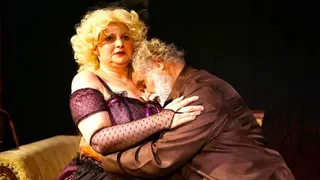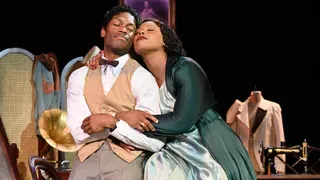March 18, 2008
Girl uninterrupted
Michael Wood READ TIME: 4 MIN.
In the shattered black family that The Gibson Girl centers on, Dad has decamped to teach at a college in Vermont. Symbolically, he has chosen Vermont Maids over Aunt Jemima. No wonder, then, that his ex-wife is brewing up some homemade syrup in the back yard to lure her man home. In a parallel case of jungle fever, a neurotic janitor who lusts over "round" black women totes a bottle of Aunt Jemima syrup, but it's been painted white. Both men claim to desire strong African-American women, but symbolically they must be whitewashed, made acceptable, drained of their power.
Or something like that.
Kirsten Greenidge's goofy new play is part fantasia, part domestic drama, part exploration of race and identity in America and part coming-of-age tale. It's partly a lot of things, but not entirely anything, not even, yet, itself. It seems Greenidge has a lot to say, but isn't quite clear on the what or how. The fact that Company One's staging of the play's local premiere is at least entertaining speaks more to the excellence of the cast than the focus of the script.
At rise, we see a quick tableaux of disparate characters, connected in ways that eventually become clear, before discovering fraternal twins Valerie and Win holed up in the girl's bathroom of a prep school, arguing over Val's truancy. A bubbly rebel, the self-sufficient Val prefers to read on her own, away from the claustrophobic classrooms. Win is invested in toeing the line, though she can be tempted into naughtiness. Both tend to lose their youthful exuberance around their strict mother, Ruth, who appears to be a tightly wound intellectual but faithfully tends her maple tree love altars and visits psychics. She's looking for news of the return of her husband, but the psychic warns that her obsessing over the past will only stir up long-buried trouble. Of course that admonition is ignored, and the family is headed for painful revelations.
Meanwhile, in converging storylines we meet the mournful Nia - an environmental hypochondriac who hates leaving her apartment except to buy radon detectors, smoke alarms and books about Hiroshima - and her amiable brother Ladell who tries, without much luck, to get her to lighten up. Nia may have had the right idea about cocooning, because Ladell has a series of bizarre encounters with the formidable Thelma, who lays claim to everything Ladell finds at thrift stores and yard sales, seemingly just for the fun of the argument. And Nia meets the deceptively gawky Nelson, who has a dangerous fascination for black women. Nelson is obsessed with the writings of an academic who turns out to be ... well, suffice it to say that happenstance and old secrets connect all these characters.
Greenidge weaves all these strands deftly and with theatrical flair. Hers is a world of both whimsy and hard truths, where characters may reveal themselves through beautifully written monologues or off-kilter encounters, and the most damaged and crazy people can find their own equilibrium and community, if only for a time. But as if distracted by her own nimble handiwork, Greenidge doesn't quite gather her hodgepodge of interesting moments into a satisfying whole. She playfully juggles stereotypes like the exotic islander, the militant activist, and the neurotic yuppie, using some like props and illuminating others from within. But other than showing that there are people behind these cultural clich?s, I'm not sure what the point is; and though I'd rather see issues of class and race treated subtly than didactically, I'd at least like a hint. As the play winds to a close, the waters are further muddied when the focus switches to revelations about Win and Val. This lyrical play doesn't really seem to be about mere facts, so why get bogged down in them?
Director Victoria Marsh keeps the staging swift and fluid without losing the emotional truths. She can't quite outrun the wordiness of this piece, but she maintains a high energy level without letting the show become cartoonish. Each cast member excels: Stephen Key is commanding in his brief appearance, Valencia Hughes-Imani radiates quiet resignation as the wounded Nia, and Heather Fry plays the mysterious psychic to the hilt without getting campy. Brittany Lang and Nyla Wissa are charming as the young sisters, and Michelle Dowd manages to make their unbalanced mother understandable if not sympathetic, showing the stunned pain behind her rages and conceits. Rubbery Greg Maraio is a hoot as the spastic Nelson, and James Milord and Valerie Stephens have terrific comic chemistry in their thrift store tussles. They also have a sly way of shifting gears, Milord going from angry to slick to flabbergasted in a moment, and Stephens indicating with the barest outthrust of her lip that no one better mess with her. David Reiffel's energetic sound design is almost a character itself, contributing to the pace and essaying to bring some unity to this fascinating but frazzled play.
Michael Wood is a contributor and Editorial Assistant for EDGE Publications.







